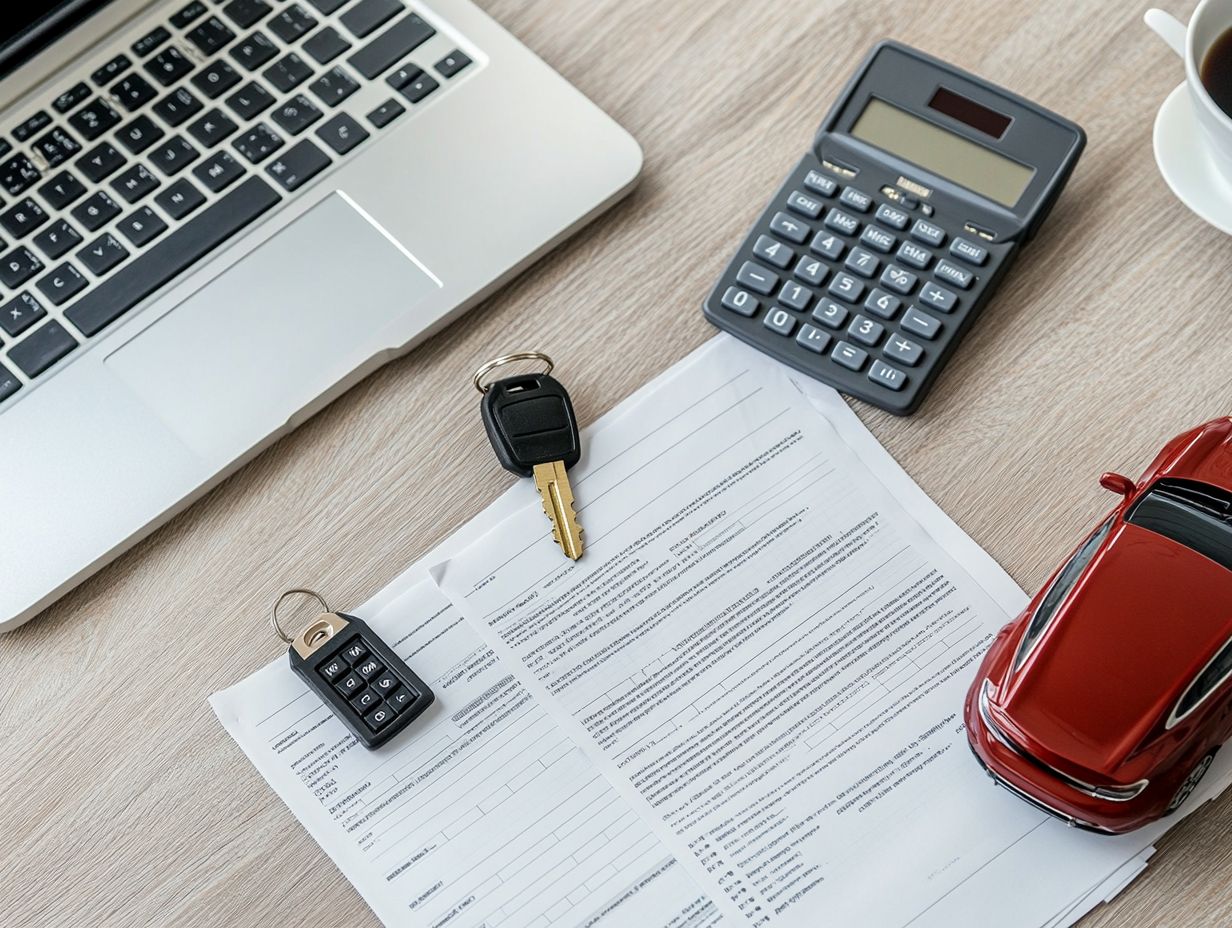Creating a Negotiation Plan for Your Car
When you’re looking to buy or sell a car, grasping its value and honing your negotiation skills can truly transform the experience.
This guide outlines the crucial steps for developing a negotiation plan, starting with assessing the factors that influence your car’s worth and establishing clear objectives for the negotiations.
Discover how to research the market effectively, prepare essential documentation, and navigate counteroffers with finesse.
By the time you reach the end, you’ll be well-prepared to seal the deal with confidence and precision.
Immerse yourself in the art of car negotiation and elevate your skills to new heights!
Contents
Key Takeaways:

- Determine your car’s market value by considering factors like age, mileage, and condition.
- Set achievable negotiation goals by researching similar car prices and deciding on a realistic ideal price.
- Prepare for negotiations by gathering all necessary documents and practicing your pitch to confidently negotiate for your desired price.
Understanding Your Car’s Value
Understanding your car’s value is essential when you step into the negotiation arena, particularly if you’re contemplating a vehicle purchase or trade-in.
As a knowledgeable buyer, you can draw on your research from reputable dealerships and online sources to establish trust and bolster your negotiating power.
Think about how factors like trade-in value, dealer fees, and current market trends can dramatically impact your deal! These elements can shape the dynamics of your negotiation and ultimately affect the outcomes in your favor.
Factors that Affect Value
Several factors influence the value of your vehicle, from its condition and age to market demand and MSRP. As a savvy negotiator, you should consider each of these elements carefully.
Pay close attention to the vehicle’s mileage; a lower number typically indicates less wear and tear, which enhances its desirability. Evaluating recent sales ads in your area will give you valuable insight into the competitive landscape, helping you establish realistic price expectations.
It’s also essential to conduct a thorough inspection of the vehicle. This can reveal hidden issues that might not only impact the price but also lead to higher maintenance costs down the line.
Understanding how financial institutions assess financing options can greatly influence your negotiations. Favorable terms can provide you with a more flexible approach to price discussions, making all the difference in your final deal.
Setting Your Negotiation Goals
Setting your negotiation goals is a crucial step in the negotiation process; it serves as a roadmap that guides your discussions and expectations throughout your vehicle purchase journey. To enhance your strategy, consider these negotiation tips for used car buyers.
Whether you re aiming for the best alternative to a negotiated agreement (the best option if negotiations fail) or looking to establish a stretch goal, having clear objectives will significantly enhance your negotiation performance and outcomes.
For buyers like you, articulating these goals can lead to strategically aligned negotiation dynamics that prove advantageous in the long run.
Determining Your Ideal Price

Determining your ideal price is essential in crafting a successful negotiation strategy. It gives you a clear target to aim for when dealing with the dealership, and the art of negotiating car prices can significantly enhance your approach.
By conducting thorough research and looking into various pricing quotes, you can gain invaluable insights into what constitutes a fair market price. Familiarizing yourself with the Manufacturer’s Suggested Retail Price (MSRP) is crucial, as this figure serves as your starting point for negotiations.
Keep in mind that the MSRP often diverges from the fair market value, which reflects actual sale prices in your area and current market conditions. By analyzing these factors, you can position yourself strategically for a successful negotiation, ensuring you secure the best deal possible while feeling confident in your purchase.
Ready to negotiate like a pro? Let s get started!
Researching the Market
Researching the market is a key part of negotiating, giving you important insights that can greatly influence your outcomes when buying a car.
By engaging in thorough online research and evaluating market trends, you can better navigate pricing quotes. This proactive approach enhances your negotiation power, equipping you with the knowledge needed for effective tactics.
Comparing Prices and Offers
Comparing prices and offers from different dealerships is an essential strategy for securing the best deal during negotiations, giving you valuable leverage in the process.
By meticulously analyzing the various offers that come with the car, like discounts or warranties, financing options, and trade-in values from each dealership, you gain a clearer understanding of the market landscape. This knowledge not only allows you to pinpoint the most competitive offers but also lets you assess the added value of each deal.
Armed with these insights as you approach negotiations, you can confidently counter proposals and express your preferences. This strategy increases your chances of getting a good deal and fosters a sense of partnership during the negotiation, frequently leading to a win-win scenario for everyone involved.
Preparing for the Negotiation
Preparing for the negotiation is far more than just a formality; it’s a critical process that requires you to gather all necessary documents and refine your essential negotiation skills for car buyers to ensure a successful car buying experience.
With the right advice and a well-practiced pitch, you can approach the dealership with confidence and authority, which will significantly influence the outcome of your negotiations.
Gathering Necessary Documents

Gathering key documents is vital for a smooth negotiation! Essential documents, such as a pre-approved loan and vehicle inspection reports, are crucial before you dive into the negotiation process. This preparation not only establishes your authority but also sets the tone for a successful engagement.
Having these documents in hand signals to the dealer that you are serious and well-prepared, significantly enhancing your credibility at the negotiating table.
Presenting proof of trade-in value, a detailed checklist of desired vehicle features, and past maintenance records further strengthens your position. Each of these elements plays a vital role in fostering trust and enables more transparent discussions.
Arriving well-prepared sends a powerful message: you’re ready to make a deal! This paves the way for smoother, more effective negotiations that can lead to the outcome you desire.
Practicing Your Pitch
Practicing your pitch is essential for refining your negotiation skills, enabling you to express your goals and needs with clarity during those pivotal interactions with the dealership. For luxury car buyers, it’s helpful to consider negotiation tips that can significantly enhance your approach.
By investing time in rehearsing across various scenarios whether it s in front of a mirror, with friends, or even during a casual chat you can enhance your delivery and adapt to the responses you encounter.
This strategy not only elevates your confidence but also equips you for those unexpected twists in conversation, allowing you to pivot your approach effortlessly.
Keep in mind that effective negotiation hinges not only on your words but also on how you respond to the other party s cues and feedback. The more adaptable and rehearsed you are, the more persuasive your presence will become.
Negotiation Strategies
Mastering negotiation strategies is your ticket to success! These strategies shape your overall approach when navigating the dealership during the vehicle purchase process.
You, like any savvy buyer, can leverage a range of negotiation tactics to bolster your negotiating power. This enables you to analyze the situation critically and adapt seamlessly to shifts in negotiation dynamics.
Tactics for Successful Negotiation
Employing effective tactics during negotiation is essential. By developing a negotiation strategy for SUVs, you gain the leverage needed to navigate the complexities of vehicle purchase discussions.
Among these strategies, anchoring is critical for setting the right expectations from the very beginning. By presenting a strong initial offer, you can effectively anchor the conversation in your favor.
Making concessions at opportune moments fosters collaboration and builds goodwill. Don t underestimate the power of silence. Pausing during discussions encourages the other party to fill the void, revealing insights you might not have anticipated.
Utilizing negotiation tools, such as cost analysis spreadsheets or comparison charts, further enables you. This ensures you are well-prepared to achieve your objectives with confidence.
Handling Counteroffers

Navigating counteroffers with finesse is essential in the negotiation process. It can profoundly impact both relationships and outcomes.
By grasping the details of negotiation expectations, you can respond strategically. This transforms potential setbacks into valuable opportunities for deeper insights and understanding.
This approach enhances your negotiation skills. It positions you for greater success in future discussions.
Responding to Different Scenarios
Navigating various scenarios during negotiations requires you to be flexible and keenly aware of the influence each party has. This allows you to adapt your strategy in real-time.
By closely observing shifts in tone, body language, and the flow of information, you can tailor your approach with precision. For instance, if a seller is resistant to budging on price, employing techniques like making strategic concessions or focusing on building rapport can foster a more cooperative atmosphere.
Recognizing the underlying interests of both parties helps you propose alternatives that cater to both sides. This ultimately creates a collaborative negotiation environment.
Embracing these principles equips you to manage resistance effectively. You can also transform potential deadlocks into productive discussions.
Finalizing the Deal
Finalizing the deal is the thrilling climax of your negotiation journey! Your ability to manage contracts effectively and communicate clearly becomes paramount.
At this stage, both parties can walk away feeling satisfied with the outcomes of their negotiations.
Now that you have these powerful tactics, it’s time to put them into action and secure the deal of your dreams!
Closing the Negotiation and Sealing the Deal
Closing the negotiation and sealing the deal requires clarity and confidence. This final stage is crucial and often sets the tone for the ongoing relationship between the parties involved.
It s essential that every aspect of the agreement is thoroughly understood, leaving no room for ambiguity.
Summarizing the key points discussed helps ensure that both sides are on the same page. This is particularly important when trust and mutual respect are at stake.
To effectively finalize your agreements, consider using strategies like:
- Preparing a checklist of terms
- Setting a clear timeline for any outstanding issues
- Creating an open line of communication to address any last-minute concerns
By taking these smart steps, you ll boost your chances of sealing that deal!
Frequently Asked Questions
What are the benefits of creating a negotiation plan for my car?
Creating a negotiation plan for your car can help you get a better deal and save money. It allows you to set your objectives, identify your priorities, and have a clear strategy for car negotiation preparation.
How do I start creating a negotiation plan for my car?
The first step is to research the current market value of your car and determine its condition. Then, set a realistic target price and identify your non-negotiable terms.
What factors should I consider when creating a negotiation plan for my car?
When creating a negotiation plan for your car, consider factors such as the car’s current market value, its condition, your budget, and what to expect in a car negotiation regarding any additional features or upgrades that may affect the price.
Can I negotiate a trade-in value for my current car as part of my negotiation plan?
Yes, it is possible to negotiate a trade-in value for your current car as part of your negotiation plan. Be sure to research the value of your car and negotiate for a fair trade-in price to get the best deal.
What should I do if the seller is not willing to negotiate?
If the seller is not willing to negotiate, you can try to find common ground or offer to pay in cash for a lower price. If all else fails, it may be best to walk away and look for a better deal elsewhere.
Is it necessary to have a negotiation plan if I am buying from a dealership?
Yes, having a negotiation plan is still important even when buying from a dealership. Dealerships are businesses and will try to make a profit, so having a plan can help you negotiate a better deal and save money.
Get prepared and take control of your next car negotiation!






